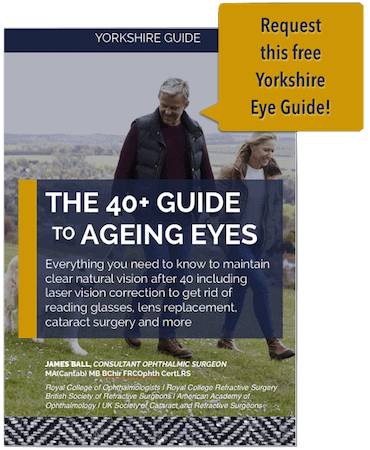
Will you need contact lenses or glasses after treatment?
Video transcription:
Consultant Ophthalmic Surgeon, Mr James Ball, explains under which circumstances patients may require glasses or contact lenses after eye treatment.
Depending on the eye treatment you receive, you may still require a pair of reading glasses or contact lenses for certain circumstances. If we’re looking after patients with keratoconus, it’s unusual for us to be able to completely eliminate the need for spectacles or contact lenses. We improve their vision but they will still need support.
Under 50
With our younger, functional patients who undergo laser eye surgery, we can always get them out of spectacles and contact lenses. Patients who are under the age of 45, 50; their own natural lens still provides them with a range of focus. Providing we achieve excellent, unaided distance vision for these patients, they’ll do the rest. They are able to bring the focus in and read without glasses and then relax and enjoy good unaided distance vision. Some of these patients may have needed enhancement to get there. For example, when we audit our outcomes of patients with, say minus five myopia, we still find 2% of them need an enhancement. They’re much better after their first treatment but there may still be some residual defocus and we don’t want to leave a patient with that.
If I’ve taken a patient on, we both have a shared understanding that we want to achieve excellent unaided distance vision. For example, if both eyes are minus 0.75 after the first treatment that won’t be good enough. The patient’s distance vision will still be slightly blurry so we will wait until we’ve achieved stability of the refraction and then we’ll move on to the formal enhancement procedure to achieve that really nice sharp focus.
Over 50
For the older patients, we offer PRESBYOND corneal laser refractive surgery. We have found that about 10% of these patients will need some kind of spectacle support in circumstances where extreme distance vision is required. The most extreme distance vision any of us undertake is night driving. We want our distant vision to see where we’re going as we drive our car. Our pupils are larger because they’re dark-adapted and that tends to cause a myopic shift, a slight short-sightedness, which can slightly compromise our distance vision.
When undertaking PRESBYOND laser eye surgery for a patient, we have deliberately made one eye slightly short-sighted. This can create a slight glare effect around car headlights when the patient’s driving at night-time. Most patients adapt to it really quickly, however, some patients find they benefit from a pair of spectacles that they can leave in the car and put on for night driving. What this does is correct the reading eye and the lovely sharp vision gets rid of any glare or halo effect. These patients don’t need spectacles for daytime driving or any other activity.
Reading at night
The other extreme of vision is reading in bed at night-time. This is when my patients are tired, the lights are down low, their eyes are dry, they’re trying to relax and it can just feel like hard work. So although the book is in focus, it feels like they’re working hard in order to read. These patients may also benefit from a pair of reading glasses just to bring in a bit of extra light and a bit of extra focus. But even those patients, and it’s about 1 in 10, will have a tremendous level of social independence from spectacles. In fact, when they come for a post-op visit, I’ll ask, ‘How are you?’ ‘Great.’ ‘Are you wearing glasses?’ ‘No, it’s excellent, really enjoying it.’ ‘Do you ever wear glasses?’ ‘Well, sometimes reading in bed at night.’ And they’ll say it like that. So these patients are delighted even though that may sound like a failure, needing a little bit of spectacle support for that reading in bed at night or reading on an evening on an old-fashioned print book, is a small amount of spectacle support that may be required after treatment.
Please book a consultation with me here at Custom Vision Clinic. You’ll meet my team who will take you through a series of assessments and then you’ll have a consultation with me, where I can collate all the data, combined with information from you so that we can pull together a full assessment of your eye health and a treatment plan to improve your vision and increase your independence from spectacles.
